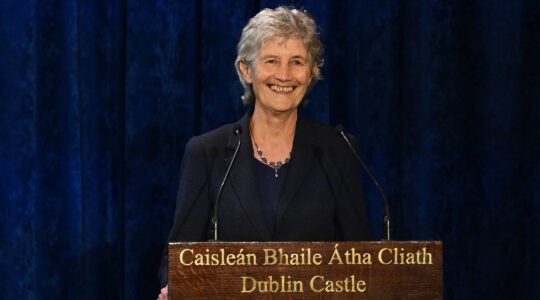BUENOS AIRES (JTA) — A solidarity visit to Iran by Argentine activists has stirred up Jewish leaders here.At a March 6 news conference, piquetero social movement leader Luis D’Elia and priest Luis Farinello, a social worker at the “villas miseries,” or shanty towns, talked about their visit to Iran the previous week. They participated in a Latin American conference and held meetings on developing economic agreements, but the trip’s main purpose was expressing support for Iran in the AMIA case. The AMIA Jewish center in Buenos Aires was bombed in July 1994, killing 85 and wounding hundreds. An Argentina court recently issued arrest warrants in the attack for 11 Iranians and Lebanese, including a former Iranian president.D’Elia, also a former government official, blamed the United States for “demonizing” Iran and said the arrest warrants in the AMIA attack are “part of the Israeli-American lobby.”Buenos Aires Jews were irate.”The trip is a provocation,” AMIA President Luis Grynwald said, echoing the sentiments of the community. “Officials of the government you support” are urging the courts to investigate the AMIA attack, Bet El community Rabbi Daniel Goldman wrote in an open letter to Farinello. “How can you sit along with someone that promotes erasing Israel from the map and denies the Holocaust?” Goldman cited his and Farinello’s work with impoverished Argentines.The Jewish community was joined by the Argentine government and Catholic Church in its condemnation.D’Elia “is not representing the government,” Interior Minister Anibal Fernandez insisted. And the bishop of Farinello’s diocese said his “political opinions are not expressing” those of the Catholic Church.The trip was part of Iran’s foreign policy, Latin American Jewish Congress Executive Director Claudio Epleman said.”By choosing two characters who are leaders among an impoverished audience with less education opportunities and thus uninformed, they produce affinity toward Iran and dislike toward Israel, Epleman told JTA. “It is a way to seed prejudice.”Though the trip was widely rejected, it was supported publicly by some politicians, writers, filmmakers and the Mothers of the Plaza de Mayo movement. This group became known during the Argentina Dirty War from 1976 to 1983, when a military dictatorship wrested control of the country, for pursuing the recovery of their “disappeared” sons and grandsons.The Plaza de Mayo mothers invited Bolivian President Evo Morales to join Venezuelan President Hugo Chavez in an “anti-Bush” demonstration last Friday in Buenos Aires. Meanwhile, Chavez also was invited to a Jewish event in Caracas. The Latin American Jewish Congress is organizing a March 22 celebration in the Venezuelan capital for the Confederation of Israeli Venezuelan Associations’ 40th anniversary. Eighty Jewish leaders are expected to attend the event.The congress is hoping it will help build bridges between Venezuelan Jews and their leaders, Epleman said. Chavez has not responded to the invitation. Argentine President Nestor Kirchner and his wife are expected to attend. Also in Buenos Aires, Jewish politicians are making headlines with two strong candidates for the June 3 mayoral elections: incumbent Jorge Telerman and Education Minister Daniel Filmus. Both are courting the Jewish vote — nearly 200,000 Jews live in Buenos Aires among a population of 2.8 million — meeting with AMIA leaders and visiting Jewish clubs, schools and synagogues. Telerman also made a recent trip to Israel. But some local Jews are hesitant to point to religion as a consideration in these elections. Candidates should not do anything that would smack of promoting a Jewish agenda, Rabbi Sergio Bergman told JTA.”That might lead people to think there are Jewish priorities scheduled,” said Bergman, a prominent, unaffiliated figure in local politics. “I believe in the needs of an open agenda for the Buenos Aires city.”
JTA has documented Jewish history in real-time for over a century. Keep our journalism strong by joining us in supporting independent, award-winning reporting.





